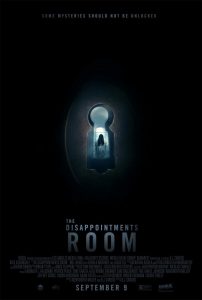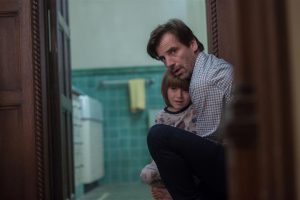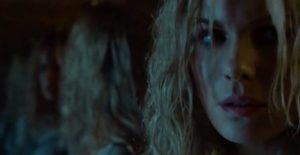
The easy joke would be to call out “The Disappointments Room” for having such an appropriate title. The joke’s on them as I had no expectations for the film going in. I went in cold, with my only knowledge of the film being the title and the time in which it would start. Therefore, I couldn’t be disappointed. I could, and did, feel like my time was wasted. The only person’s time who benefitted from this film would be Greg McLean, the director of “The Darkness,” for he no longer lays claim to the blandest horror film of 2016. D.J. Caruso takes that prize his latest directorial effort.
“The Darkness” and “The Disappointments Room” are quite similar when given thought to compare both of them (a punishment I hope nobody has to do endure). Both feature cookie-cutter ghost stories wrapped around mental illnesses. “The Darkness” had an autistic young boy be the center of the paranormal activity while “The Disappointments Room” includes a protagonist suffering from manic depression. The latter also has child ghosts with deformities, making the film an equal opportunist when it comes to illnesses. Too bad there’s no opportunity for inventiveness by Caruso.

The first half of “The Disappointments Room” plays out like a standard haunted house story. A family moves into a new home in the country, one that reeks of horror due to the architecture alone. Almost immediately, weird things begin to happen, such as doors opening and closing by themselves, creaks throughout the house, the sound of a baby crying, a little ghost girl prancing through the halls. There’s even a sequence that’s heavily reminiscent of “The Shining” to the point where it’s almost gimmick infringement (which wouldn’t be the first time for Caruso, the director of “Disturbia”). Oh, and it’s almost always storming because it storms in other horror films, so it storm in this one.
The horror elements themselves could all be chalked up to imitation. Everything happens in this film because it happened in other horror films. Bumps in the night startle the new tenants? Check. Said bumps turn out to be a cat, eliciting a cheap jump scare? Check. A terrible backstory is provided to explain the haunting? Check. Only one character believes the house to be cursed while the others are oblivious fools? Check. Dumb twist accompanied by an even dumber ambiguous ending? Check. Sufficient tension and dread to make the experience worthwhile? Swing and a miss!

The only fresh aspect the film has to offer is the titular Disappointments Room. It resides in the attic of the house, hidden by a bookcase. Its intention is to shelter a deformed child from the world until its merciful death. The deformed child, a disappointment in the parents’ eyes (hence the name), now haunts the home. So do her parents, because apparently their souls are trapped in purgatory as well. As is their vicious guard dog. No word on if their trusty servant followed them into purgatory. I certainly followed them, as watching this movie felt like purgatory.
That aspect is fresh, but not entirely original. Using deformities to elicit drama and fear is nothing new, made most famous by Tod Browning in his classic film, “Freaks.” I have no recollection of the Disappointments Room angle ever being used and don’t care to find out. If it had been, I presume that effort wouldn’t have been as laughable as this one. So laughable the librarian explaining the concept of the Disappointments Room cracks wise at her “spooky” explanation, calling herself out for having seen “Poltergeist” one too many times. If the film is making fun of itself, how am I supposed to take it seriously!?!

The second half of the film is a limp psychological thriller. It centers on the emotional breakdown of Dana (Kate Beckinsale), who’s still reeling from the death of her infant daughter. This fact was brought up only in passing earlier in the film as a convenient excuse for them moving to the country and why they won’t leave the haunted house. Her husband, the insufferably cheeky David (Mel Raido), believes its best for her to away from Brooklyn and her architecture firm. The only reason she’s an architect is so the Disappointments Room can freak her out immediately because it’s not on the floor plan. Listening to a person frantically shouting about a floor plan is hysterical, not frightening!
Caruso tries to play with the notion that the house isn’t haunted, but that Dana is crazy. This would work if A) The film was a psychological thriller from the start, and B) I actually gave a damn! Despite Kate Beckinsale’s game effort, I couldn’t care less about her plight or that of her families. The drama felt shoehorned in, first rearing its ugly head out of plot convenience, then out of cheap emotional manipulation. The revelation of her daughter’s passing feels forced, sad only because said incident would be sad had it happened to you. It didn’t happen to me, it happened to Dana, and she’s criminally underdeveloped that I couldn’t empathize with her. There was only one scene, where she breaks down at a dinner party, that emotionally moved me, and even then it’s dragged out and has too much dark comedy thrown in to sully the whole ordeal.

I didn’t even mention their son, Lucas (Duncan Joiner), because he serves no purpose other than to be precocious and in danger. And even when he’s in danger, it’s always revealed to be a nightmare or false premonition up until the weak finale. There’s only so many times a director can use the cop out jump scare before the audience begins to give up hope. Also serving no purpose other than to be in danger (but not precocious) is Ben (Lucas Till), the town handyman who comes to fix the leaks in the house. He inexplicably flirts with Dana and then has his life endangered.
“The Disappointments Room” could work if it were structured differently. Start the film off as a psychological thriller examining Dana’s psyche. Slowly introduce the paranormal elements and hint that they may be manifestations of her crumbling mental state. It’d make perfect sense for Dana to concoct a Disappointments Room to cope with her disappointment over her daughter’s death. The twist, while still telegraphed, would have more weight to it, hopefully preventing it from falling flat on its face. Alas, the film was not structured as such, but reversed completely. This results in the two elements never complementing one another, awkwardly shoved together to tie up loose ends. Just thinking about their implications together gives me a headache!

I don’t know who to blame for “The Disappointments Room’s” failure. D.J. Caruso is the easy target, seeing as how his filmography is incredibly spotty (with entries such as “Eagle Eye” and “I Am Number Four”). Wentworth Miller co-wrote the screenplay alongside Caruso, though chances are his draft was heavily re-written. The editing department and studio interference could be the culprit, though the latter let this sit on the shelf for two years before dumping it into theaters with minimal promotion, so jury’s out on why they’d sabotage a product they seemingly don’t care about. Whoever is to blame, you took a good concept and robbed it of all its worth. How disappointing. Ah, son of a bitch! I made the joke I swore I wasn’t going to make. Look what this atrocity made me do!
Final Rating: D-
